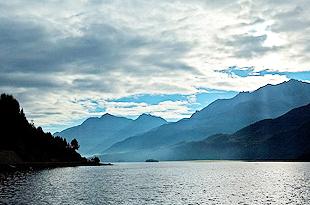Lakes

Lakes are highly valued focal points for leisure activities (boating, swimming), fishing and drinking water supply. They may also provide many services such as flood prevention and control, pollution reduction. Lakes are often split into two main types (shallow and deep lakes) as they tend to have different sensitivities to pressures such as water pollution and climate change.
High quality shallow lakes are characterised by healthy submerged plant communities and associated diverse communities of invertebrates, fish and wetland birds. Phytoplankton is also present but typically less important for primary production than in deep lakes due to higher flushing, grazing of zooplankters.
Naturally characterised by clear water, these systems have frequently shifted into turbid, phytoplankton-dominated states lacking macrophytes, primarily caused by nutrient pollution (eutrophicationEnhanced primary productivity caused by nitrogen and phosphorous). Climate change may exacerbate eutrophication symptoms, with warmer summers resulting in increased phytoplankton growth, enhanced nutrient release from the sediment and potentially favouring invasive plant and fish species.
Deep lakes are mainly found in mountainous regions and under natural conditions they are characterised by very low nutrient loads. Macrophytes are restricted to a narrow belt along the shores and phytoplankton abundance is low. Even the deep zones are well oxygenated throughout the year and provide high quality habitat for benthic invertebrates and cold water adapted fish. The main human impacts are acidification, eutrophication and management of water level regimes.
Eutrophication in deep lakes causes enhanced primary production by phytoplankton, in sever cases algal blooms and oxygen depletion (particularly in the deep zones) may affect all processes and species. The main physical effects of warming are a longer and more intense stratification period. This stratification of the water body during summer into warm surface water and cold deep water can result in accelerated oxygen depletion of the deep zones in more enriched deep lakes.